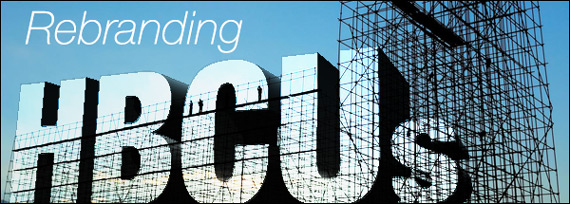
by Richard F. America
Editor’s Note: In an earlier article for JBHE, Professor America asked “Can HBCUs Compete?” Now Dr. America offers his views on how HBCUs can go about a transformation so that these higher education institutions can thrive in the twenty-first century. The views expressed are those of the author. We invite readers to comment on Professor America’s proposals.
Morris Brown College, St. Paul’s College, Saint Augustine’s University, and other historically Black colleges and universities (HBCUs) have been in the news because they struggle to survive. At the same time, online learning, for-profit universities, and other new forms have emerged to deliver higher education. HBCUs must change or diminish. Visions, missions, branding, strategy and governance have grown obsolete. These must all be corrected to make sure the schools are effective and successful for another 100 years.
Vision: The HBCUs have generally seen their role as offering education at reasonable cost to previously excluded, “disadvantaged” students. They are often the first generation in their family to attend college. The colleges say they create opportunities to gain training and credentials that open doors and make upward mobility a realistic possibility.
This vision is actually now a hindrance. The colleges are operating in a new competitive reality. Students can, and do, find nurturing, understanding, encouraging, supportive resources at many other institutions, because they have changed. In the new competitive environment, that has emerged since the civil rights movement opened the doors of previously segregated colleges, HBCUs need a new vision.
The new vision should, generally be to provide quality education to a diverse student body, in a competitive institution that is on equal standing to all other similarly situated institutions.
Mission: In general, the missions of the HBCUs are similar to the visions: To help the poorly prepared, to remediate, and to provide understanding, and sensitivity to their students.
Instead, the missions of HBCUs should be to rise in the rankings from fourth tier to third or second tier by 2020 and to benchmark on higher-ranked schools so as to continuously improve in all aspects of curriculum, teaching, research, and service. And by doing that to serve a diverse student body who find our approach a good fit for their personal preferences.
Branding: The HBCUs have long promoted themselves as offering special emphasis on African American heritage, history, cultural awareness, and sensitivity. They have positioned themselves as havens for students who would be shunned, or marginalized at other institutions, because of their race.
Those are out of date concepts. The demographic and competitive realities have changed. The HBCUs now face competition for these students and are not operating in protected markets any longer. They must now enroll a diverse student body. They can still honor their legacies with centers, institutes, research programs, buildings, named scholarships, arts programs and festivals of many kinds named for founders, alumni, and important historical figures.
But “Blackness” per se, cannot be a successful, or meaningful differentiator that carries real advantages or weight. These institutions must compete in the general market place of higher education, and must do it well.
HBCUs should form a new organization – The National Association of Colleges and Universities (NACU). NACU will help them compete by focusing on operating effectiveness, great governance, and quality leadership development. It will complement NAFEO (National Association for Equal Opportunity), UNCF (United Negro College Fund), and the Thurgood Marshall College Fund.
Further, the members of the new NACU should brand themselves not as HBCUs, but as High Value Colleges and Universities (HVCUs). HVCUs will send the kind of signal that will change their perception and standing in the eyes of accrediting agencies, potential applicants, faculty, administrators, and donors.
With those fresh brands, the 100 current HBCUs will be able to rethink their place among the 3,500 colleges and universities in the United States and the emerging online, and for-profit competition that seems to have a strong attraction for certain cohorts of African Americans seeking higher education on reasonable terms.
Strategy and Governance: The HBCUs have been in the news with stories of financial weakness, accreditation defects, dropping enrollment, leadership misbehavior and turnover, and student, alumni, and employer dissatisfaction. These are symptoms of poor leadership and weak strategies. Boards of trustees are the root of many of the problems. They are too often composed of cronies, figures with religious backgrounds and no credible experience, knowledge, or ability in strategic thinking and analysis. Many have no useful resource networks, and no valuable contribution to make in understanding higher education, or adding value to charting a successful new direction.
Boards must change. They must be composed of serious professionals, drawn from business, law, the sciences, entrepreneurs, and especially from investment banking, and management consulting, where the right skills are present to a high degree.
Boards must agree to annual rigorous training, as offered by groups like the National Association of Corporate Directors. And boards must agree to annual third-party evaluation.
Training and serious objective performance evaluation is missing at most HBCUs. Adding these requirements will go far toward turning around troubled institutions, and insuring that those that are currently succeeding, can compete even more effectively in the future.
The HBCUs should all be fully engaged with the Association of Governing Boards. AGB offers valuable orientation for new board members, and quality ongoing governance assistance. This resource is grossly underutilized by these schools.
Likewise, the American Council on Education is available, and the schools should be proactively working with ACE on all aspects of strategy and operational improvement.
There have been times in the past when the Rockefeller Foundation, and farsighted HBCU leaders worked to strengthen specific functions like treasurer, registrar, deans of students, etc. These working programs were successful, and did strengthen operations. But for various reasons, these collaborations were not sustained.
Now, is the time to re-engage.
Conclusion: HBCUs can thrive if they change their self-image, sense of mission, and market, and drop old habits that hinder progress in a modern world of changing demographics.
Richard F. America is an adjunct professor at the McDonough School of Business at Georgetown University in Washington, D.C.













I agree with 1 out of the 4 areas. Strategy and Governance. That’s it.
Mission:
This should not change at all. HBCUs can strive with changing this. I will say that HBCUs need to focus more on research. I know the faculty will hate that but we need the money.
Branding and Vision:
If you change the branding you will be taking the “B” out of HBCU. HBCU use to be where the brightest minds of blacks used to attend. But now it has become for the worst of the worst. That needs to change. Instead we (parents) will send our kids to HWCUs where we will be less than 1% of the student population. That is crazy. Why? A Harvard degree is no different than a Howard degree.
My solution would be:
Lower the number of 4 year HBCUs. (merge, close, whatever).
Change some to 2 year institutions. Upon graduation you can automatically go to a 4 year.
Raise the academic standards of the 4 year institutions.
Have the 4 year institutions focus on research.
Convert most programs to online.
If you want me to expand on any one of these please let me know.
I am proud of my HBCU!
Thanks KJ,
You saved me a lot of writing.
This discussion needs to be expanded.
I know that many HBCU’s are not cashing in on the ONLINE options as best they could.
Again, Thanks for commenting.
Let me provide a little bit more detail.
Lower the number of 4 year HBCUs. – I am not saying get rid of them. Just have them focus on what they do best. There are some HBCUs that would be better served being a two year feeder school. These are the struggling ones with a few graduate programs and a total population of under 1000 students. Why have graduate programs that suck up funds when 10 people are enrolled in them? Many of our kids start out at community colleges because of high tuition cost. Some HBCUs could take the place and be that alternative.
I learned something yesterday. That 40% of community college grads are unable to transfer credits to a 4-year college. Also 14% lose 90% of more of their credits when they transfer to a 4-year college. (link to article- http://t.co/yR6zbWiklx) HBCUs can fix that with 2+2 programs between the 2 year institutions and the 4 year institutions.
An HBCU cannot improve on research if their primary focus is remediation and getting their students caught up to standards as stated very clearly in the article. Community colleges do that job adequately and cheaper.
To become a research institution they need a stronger academic pool of candidates to build upon. And with many of HBCU’s having a very low admission standards (2.0-2.5 for most) they won’t build that needed pool of talent anytime soon.
Ugh, a thorough historical examination should be pursued. HBCU”s like Historically Black primary and and secondary educational institutions produced scholars, activists and leaders. They operated with current and historical context. Carter G. Woodson feared this would happen. In his book ” The Miseducation of the Negro,” he said~ The large majority of the negroes who have put on the finishing touches of college (getting all of their advanced degrees), are becoming all but worthless in the development if their own people. HBCU’s are graduating 1000’s of students who enter systems and are mostly clueless about why their own people can’t move collectively from the bottom. HBCU’s have lost their analysis and their students are no better prepared to eliminate institutional racial disparities than a white student from a PWI.
I am bitterly disappointed with this ‘black’ author’s “solution” to the economic dilemma of black colleges, which is, essentially, to drop dead! And to think that I read his book, DEVELOPING THE AFRICAN AMERICAN ECONOMY, with great interest, years ago! Well, this adjunct professor at Georgetown University should know we ain’t going nowhere, no time soon! His screed is predicated on the closing of the AME’S Morris Brown College in Georgia, and the Episcopalian’s Augustinian College in Virginia. Shame on this once-black oriented man. He has certainly changed greatly!
Many of the suggestions I disagree with are the ones reacting to external conditions that are not necessarily moving us forward, just ‘somewhere’ like online for profit ‘schools’ and acceptance at PWIs. These trends have not really been determined to be beneficial or anything more than a passing fancy. Continued attacks on Affirmative Action, and the growing questions about the efficacy of online learning make these influences tenuous at best. Will Ivy league institutions let go of brick and mortar and pass their billions of dollars of endowments onto reparations due the descendants of enslaved Africans? I doubt it. HBCUs do need to clean up their act especially at the administrative and board levels. HBCUs must never abandon their mission of educating and socializing our own children. It is never acceptable for us to abandon the work of creating an African future based on our African past. We have an obligation to educate our children to achieve goals as a people. Being African should never be considered to be obsolete or out of fashion. Nothing that was discussed addresses the global crime of dehumanizing and destroying African people world wide and setting the ground work for all of the unprepared black students and the economic anemia causing HBCUs to look incompetent. Where does Dr. America’s research on reparations fit in with this discussion? Why are we scrambling for pennies when we are owed trillions of dollars? Why are we not fighting academically and collectively?
It seems as if this individual is saying “African descent and orientation is now out of style; so go with the mainstream!” This is unfortunate, as our young people and communities still grapple with many of the challenges of the past, despite recent “post – racial” talk. Quoting from Woodson’s book is VERY appropriate, because it could be argued that the challenges still exist in our communities precisely because of “educated” individuals such as Mr. America. Some of his points have merit, but the vision, branding and conclusion sections are disconcerting to me. Returning to Mr. Woodson’s book, a person with this “American” outlook would likely not even consider one of his “HVCU’s”!
The changes that have come about as a result of the changes in civil rights legislation were a demarcation to all educational institutions. Majority state and private institutions responded by co opting our prime students and athletes. They also brought into their curriculum many of the areas of study that set HBCU’s apart from other schools.
Following the curriculum were the top tier professors from HBCU’s and future educators that would have been a part of the Faculty of HBCUs.
The flaw is that Historical black institutions have failed to recognize the value of their history and its emphasis on Quality. The HBCU’s leadership did not adjust it’s vision and mission to the current environment. Changes in it’s Governance, Trustees, is required to sustain them into the future. A change in the relationship with their, alumni and the marketing of themselves as viable educational institution to all people looking for educational degrees is a requirement. the 2yr to 4yr route is one option that these schools need to develop and promote as well as the online options. these two alone will lead to financial benefits.
I agree 100% with this set of solutions. We can’t ignore that there are just flat out better options out there for anyone going to college.
In-state PWI are far cheaper for low income minorities and will come with a better academic reputation than most HBCUs
Community colleges provide remedial academic services for a quarter of the cost of HBCUs and it doesn’t make any financial sense for them to compete on that level.
HBCU’s need to rebuild and rebrand if we want them to last another 25 years
I am not sure why there is an aversion towards online learning among some of “us.” “We” have lost thousands…and will continue to lose….
“With those fresh brands, the 100 current HBCUs will be able to rethink their place among the 3,500 colleges and universities in the United States and the emerging online, and for-profit competition that seems to have a strong attraction for certain cohorts of African Americans seeking higher education on reasonable terms.”
I work at an HBCU and I don’t even consider the “school” to be an academic institution. Instead, it is a credentialing institution. It’s mission, unstated, is to provide credentials to people who have poor organizational, academic, and communication skills. Cheating is rampant in higher education writ large, but it is a culture at HBCUs (I have several colleagues who work at other HBCUs and the stories are almost always the same). Students at HBCUs cheat so much that when they’re caught and failed, they are unable to understand that they’ve broken a major rule. “So I copied from a website, what’s wrong with that? That’s how I do my school work” is the common statement from the student caught cheating. And they are horrible plagiarists, completely unable to conceal the sources from which they copy. Font sizes change, they include in their pasted product superscript footnotes from wikipedia and embedded links. Most students, when caught cheating, will take their F. “So I failed, so what. I don’t care.” Others call family and friends, and then before too long the administration pressures the faculty member to let the student do the assignment over. So if the student presses, and many of them do, there aren’t any penalties for cheating–and despite clear directions to the faculty to police it.
Another major problem at the HBCU where I work and where my colleagues work, the administration is so completely disorganized, that it’s amazing these institutions retain accreditation. Nothing begins on time, well except special events to celebrate the institution–and other b.s. crap that’s an excuse to cancel classes for part of the day. Administrators cannot even plan out a semester. Most run on 10, 11 week semesters that’s about five short of the nearby PWI. Club activity takes precedence over classes. Students can spend their entire semesters attending club meetings and not attend one class, and their absences are to be excused. Students can add classes six weeks into the semester–can even register for classes six weeks into the semester, and professors have to allow the student to make up work missed.
Professors are inundated with paper work when students fail, and most fail. If I didn’t cave to the pressure, I’d have 80-85% failure rates. And it’s not because the students are dumb, it’s because they cheat, and/or are disengaged entirely from academic work. Most don’t even know what academic work is. If I were to go into class with legos and lincoln logs and other childrens toys, and inform students that playing with these will be the lesson for the day, most students would say “okay, cool!”
My first three semesters, I planned challenging courses for upper level students in the major. There was a major revolt. They did complain to me in person first, and then went to the alumni association, which went to the administration, and the administration basically told me to make classes really easy. I asked about the purpose of the institution, and administration clearly said without equivocating–we’re here to give these kids degrees that they can’t get elsewhere. Well, yeah, if you’re unable to do some work in college, you won’t get a degree at a PWI.
Then there’s graduate education. Grad students’ attendance rate in classes is far, far worse than their undergraduate counterparts. Graduate students expect multiple choice exams, and the ability to take the exams open-book and as many times as they wish until they achieve a passing grade. Graduate students are among the worse plagiarists at the entire institution where I work. If you fail a graduate student, they come back the next day with their lawyer.
Why are these institutions this way? The people who run HBCUs for the most part graduated from the institution where they work. Most of the administration is overpaid, and few of them can do anything on time. Whenever there’s a campus event (except athletics), you can bet that the event will begin somewhere around 40-45 minutes after the planned start time. Getting off point here, administrators are oftentimes less educated than some of the student body. Much of the internal communication, pamphlets, e-mails, presentations, faculty directives, etc. are replete with spelling errors–even simple words are misspelled.
Some white legislators and governors have proposed closing some state-run HBCUs–and then there’s the outrage from the black community–many of whom didn’t even attend an HBCU. There’s no point in having them open. Where I work, in the local community, very few graduates land professional jobs outside of the HBCU itself. Few employers consider hiring any of its graduates. Actually, a human resources friend of mine in the local area–a fortune 500 company–claims that she and her staff routinely pass around application materials of the school’s graduates who are applying at the company. They do this as a comedic aside, usually during lunch breaks and at the 5 p.m. drinking hour. They laugh their asses off at the feeble application materials.
And that’s the last point to make here. People at HBCUs whether in the administration or the faculty or the student body cannot follow, will not follow, any rules or guidelines or standards. Rules are things that are to be drawn up, publicized, and then ignored. I’m leaving out all the financial mismanagement stuff, but secretaries who are related to some dean or provost–usually people without a degree from any institution–can be found at HBCU’s making in the six figure range. No wonder why these schools don’t have money for campus beautification, or to upgrade facilities.